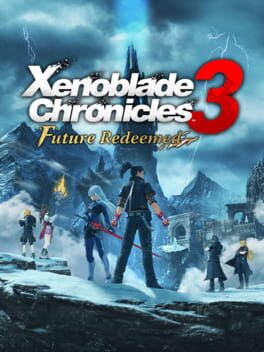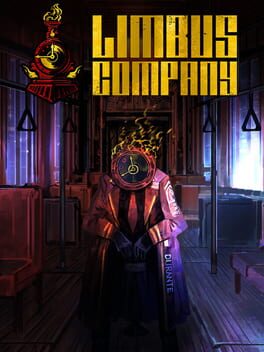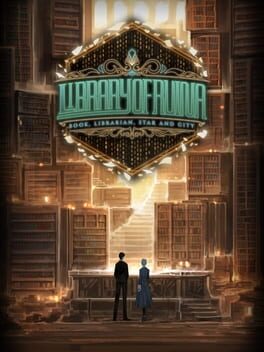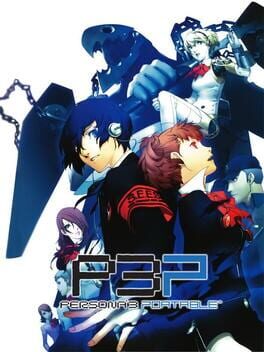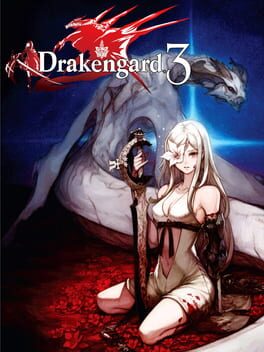Guilhermee_
14 reviews liked by Guilhermee_
Dragon's Dogma II
2024
NieR Re[in]carnation
2021
Vou tentar ser o mais breve possível nessa "review" mal escrita, porque esse jogo não vale mais um segundo sequer do meu tempo e esforço.
Nier Reincarnation é um gacha e é ruim, e morreu não foi à toa. Só terminei o jogo base porque era um desafio jogar mais de 30 minutos disso por dia. O combate é terrivelmente chato, repetitivo e cansativo, onde não exige literalmente nenhuma interatividade do jogador, é basicamente tudo full auto, onde os personagens fazem absolutamente tudo sozinhos e você só fica assistindo e perdendo seu precioso tempo e gastando bateria do seu celular. E quando você não tá assistindo um dos combates mais bostas já feitos, você apenas fica assistindo a personagem principal andando em linha reta pelo mapa, que geralmente é composto de cenários genéricos de ruinas, e a única "mecânica" sequer de gameplay que existe nesse jogo é pra fazer você gastar seu dinheiro e tempo tentando ganhar personagens e itens mais fortes pra conseguir avançar na campanha, resumo, aquela clássica asquerosidade de gacha que você já conhece. Então pra preservar a minha sanidade mental decidi TALVEZ ver o resto da história dessa porcaria de jogo no youtube num futuro nada breve.
Mas pra não dizer que absolutamente tudo é terrivel, a trilha sonora é ótima e a direção de arte durante as histórias é bem charmosa e bonita, inclusive algumas poucas dessas histórias são bem escritas e impactantes, com alguns personagens muito interessantes e cativantes, como o Deimos e Akeha.
Enfim, às 6 horas (que pareceram 15 horas) que passei jogando Nier Reincarnation foi uma das experiências mais miseráveis que já tive com a mídia, e eu quero que todos os fãs de Nier vão pra puta que pariu.
Nier Reincarnation é um gacha e é ruim, e morreu não foi à toa. Só terminei o jogo base porque era um desafio jogar mais de 30 minutos disso por dia. O combate é terrivelmente chato, repetitivo e cansativo, onde não exige literalmente nenhuma interatividade do jogador, é basicamente tudo full auto, onde os personagens fazem absolutamente tudo sozinhos e você só fica assistindo e perdendo seu precioso tempo e gastando bateria do seu celular. E quando você não tá assistindo um dos combates mais bostas já feitos, você apenas fica assistindo a personagem principal andando em linha reta pelo mapa, que geralmente é composto de cenários genéricos de ruinas, e a única "mecânica" sequer de gameplay que existe nesse jogo é pra fazer você gastar seu dinheiro e tempo tentando ganhar personagens e itens mais fortes pra conseguir avançar na campanha, resumo, aquela clássica asquerosidade de gacha que você já conhece. Então pra preservar a minha sanidade mental decidi TALVEZ ver o resto da história dessa porcaria de jogo no youtube num futuro nada breve.
Mas pra não dizer que absolutamente tudo é terrivel, a trilha sonora é ótima e a direção de arte durante as histórias é bem charmosa e bonita, inclusive algumas poucas dessas histórias são bem escritas e impactantes, com alguns personagens muito interessantes e cativantes, como o Deimos e Akeha.
Enfim, às 6 horas (que pareceram 15 horas) que passei jogando Nier Reincarnation foi uma das experiências mais miseráveis que já tive com a mídia, e eu quero que todos os fãs de Nier vão pra puta que pariu.
'Three years had passed. Five years had passed, and still the trees remained with their roots spread out on the bottom of the water. It looked almost as if they were still alive now. Ohina thought to herself; in those days my legs were still strong. My eyes could still see far.'
– Michiko Ishimure, Tenko, 1997 (tr. Bruce Allen).
The post-war years in Japan were accompanied by an ideological shift in the ideas of work and family, with the development of the sarariiman myth. The ideal household, promoted by the Japanese government, was one in which the wife took care of the housework and the children's education, while the husband provided for the family's economic needs. This dream was made possible by the employment conditions of the 1960s and 1970s, when the average worker could expect to spend their entire career with the same company. Representations of the Japanese sarariiman have largely evolved over time, making him both an archetype of ideal masculinity through his loyalty to his employer and his sacrifice for his family (kigyō senshi, corporate warrior). At the same time, other representations emphasise his submissiveness, in line with the westernisation of Japanese culture [1].
And every morning the door closes
The collapse of the economic bubble in the 1990s shattered this ideal, weakening the labour market and the salaried middle class [2]. The destruction of this family harmony, based on a patriarchal concept of sacrifice, led to the dysfunction of Japanese households and the gradual disappearance of fathers from the family unit. The generation born after the 1970s had no memory of the economic miracle of previous decades and found themselves thrust into a world where inequalities were apparent from school and career prospects were mediocre at best. Authority figures were viewed with suspicion and contempt, including the government, teachers and parents. They are said to have failed in their role as guardians: teachers are portrayed as incompetent or murderers, politicians as indifferent to misery and colluding to steal public money, while fathers resign and mothers weep at their powerlessness [3].
The destruction of traditional masculinity, which is still struggling to build a new mythology, has been followed by a reassessment of the place of women, who are regarded as the driving force for Japan's economic recovery and the bulwark against demographic decline. Unsurprisingly, Shinzo Abe's economic programme has focused heavily on the role of women, both as workers and as mothers. Yet Abenomics have failed to transform the labour market environment: government coalitions have been largely conservative, and measures for women have been anemic at best [4]. What remains is a vain discourse to encourage reproduction – despite the economic conditions hardly being met for raising a child – which is reflected in cultural production.
Undoing ikumen in post-Abe Japan
The overrepresentation of motherhood, however, should not obscure the transformations of fatherhood in the 2000s and 2010s. Xenoblade Chronicles 3: Future Redeemed is a striking example as it deals directly with this issue, whereas the original game looked at the question of reproduction and family in a broader way [5]. The heroes of the first two games return, each embodying a different vision of masculinity. Shulk retains his candour while appearing more calm and disciplined. He represents a self-controlled masculinity driven by both elegance and intellect, in the style of the erudite warriors of pre-modern Asia. Rex is much rougher, constantly struggling to find a way to express his feelings and frustrations, despite his good intentions. In some ways, his development is reminiscent of that of Ryōta Nonomiya in Hirokazu Kore-eda's Soshite chichi ni naru (2013), an architect who is unable to provide emotional comfort to his family. Confronted with the way Shulk interacts with Nikol, Rex finds a new harmony with Glimmer, full of empathy and love.
Perhaps the most important aspect of these relationships is that their nature remains implicit. Many of the reminiscent and contemplative passages in Future Redeemed rely on knowledge of the franchise, but the theme of fatherhood runs throughout the DLC. Ultimately, the heroes' distance from their children is a response to the debates surrounding ikumen, a term used to describe fathers who are involved in raising their children in order to make them appear 'cool'. The ideological programme of Abe's Japan relied heavily on this imaginary to encourage fathers to participate in the household, but the figure of the ikumen has been widely criticised for giving men a nice label, even though they contribute to the dysfunction of both the domestic economy and their working environment [6].
The figure of the ikumen can be understood as a way for fathers to make themselves useful somewhere and gain recognition from their peers, a way to find a place to belong (ibasho) after being ejected from both the family unit and the corporate space. Future Redeemed responds to this sociological question in the same way as several local associations have done, through the figure of the ikimen, men who decide to foster communities of solidarity in the same way that they would look after their children [7]. Shulk and Rex, thanks to their experience, become the tutelary figures of the Liberators and Colony 9, but they are more interested in being mentors than leaders. Like the base game, Future Redeemed focuses on building bonds between the various members of the community until their resilience is no longer in doubt. As the various characters point out to Matthew, the virtue of a leader is to bring people together when necessary, not to control their lives. Through the various side-quests, the inhabitants of Colony 9 also gain texture and individuality, autonomy and confidence – more so than in the base game, thanks to a sparser cast.
Maybe tomorrow
There is an optimistic melancholy to Future Redeemed, between the series' various iconic locations reduced to lonely ruins and the forward-looking language of the characters. Like Tetsuya Takahashi's other games, the DLC shines by magnifying the ties that bind individuals, variations on the theme of friendship, love and togetherness – lessons that must be carried beyond the game. A single existence is but a drop in the ocean of human history. Civilisations, buildings, masterpieces, passions, dreams and memories can vanish in an instant, but there remains an explicit duty to cherish the past, not in blind adoration, but in preparation for the future. Future Redeemed constantly refuses to elevate Shulk and Rex onto a pedestal: they are already fading figures, as their injuries attest. Even A, for all her unwavering calm and penetrating gaze, chooses to remain outside the life that Colony 9 and the Liberators have decided to cherish; not because she is without compassion for the survivors, but because she knows – and this is her legacy – that the future belongs to them alone.
As Xeno veterans know, every story has an ending, and not all sequels need to be told. Looking back at Lost Jerusalem and thinking about building a better world is poignant, but this is the everyday story. Fighting for a fairer and more humane world. It may take generations, but the important thing is to keep dreaming and struggling for it, because there is nothing more tragic than an existence without hope, even when darkness seems to engulf everything. Of course, there is something idealistic and simplistic about this statement, but Future Redeemed, like the base game Xenogears (1998) or Xenosaga (2002-2006), leaves room for misery and sadness. Inequality is part of every society, and Takahashi has no illusions about the ghosts that will always roam the Rhadamanthus of the future. This is how Future Redeemed concludes the epic of the Xenoblade Chronicles, just as Episode III: Also sprach Zarathustra (2006) invited one to close their eyes for a while, until the light of hope reappears, maybe tomorrow. In a way, Future Redeemed is just an open door. Its more meticulous progression with Affinity Points, its more fluid exploration thanks to numerous ergonomic additions, and its gameplay designed around accessories rather than classes all point to rich ideas for Monolith Soft's next projects.
I may still be around to see what paths they take.
Maybe I won't.
I will sleep a while, until the dawn wakes me up again...
I still believe... come what may...
__________
[1] Annette Schad-Seifert, 'Samurai and Sarariiman: The Discourse on Masculinity in Modern Japan', in Arne Holzhausen (ed.), Can Japan Globalize? Studies on Japan's Changing Political Economy and the Process of Globalization, Springer, Berlin, 2001, pp. 206-208.
[2] Some contextual details are provided in my reviews of Kaze no NOTAM (1997) and Power Shovel (1999).
[3] This is a rather simplified picture of the cultural representations of the 1990s and 2000s, but they occupy an important part of successful audiovisual production in Japan. On the topic, see Shuk-ting Kinnia Yau, 'Bad Father and Good Mother: The Changing Image of Masculinity in Post-Bubble-Economy Japan', in David G. Hebert (ed.), International Perspectives on Translation, Education and Innovation in Japanese and Korean Societies, Springer, New York, 2018, pp. 243-253.
[4] Mark Crawford, 'Abe’s Womenomics Policy, 2013-2020: Tokenism, Gradualism, or Failed Strategy?', in The Asia-Pacific Journal, vol. 19, no. 4-4, 2021.
[5] On the topic, see my review of Xenoblade Chronicles 3 (2022).
[6] In particular, wives and employers are very suspicious of the ikumen modoki, the father who prides himself on being involved in running the household and bringing up the children, but in reality makes no effort at all. He builds a positive image of himself on his wife's efforts and uses the household as an excuse to shirk his professional responsibilities. The yarisugi ikumen, the man who is overly proactive in his domestic involvement, is equally feared by women, both because he often disrupts household routines and wastes time, unnecessarily burdening his spouse with additional work. On the topic, see Nicholas Michael Feinig, Rearing the Family, Moving Society: Rethinking Gender, Kinship, and Work through Japan’s Fathering Movement, PhD thesis, University of Toronto, 2020, pp. 99-134.
[7] This figure is also subject to specific criticisms, notably the contamination of spaces intended for women by a corporatist and hierarchical masculinity, and the fact that these groups are more places for fathers to socialise than spaces for improving local community life; nevertheless, they are a new ibasho for men, outside the workplace. On the topic, see Nicholas Michael Feinig, op. cit., pp. 230-276.
– Michiko Ishimure, Tenko, 1997 (tr. Bruce Allen).
The post-war years in Japan were accompanied by an ideological shift in the ideas of work and family, with the development of the sarariiman myth. The ideal household, promoted by the Japanese government, was one in which the wife took care of the housework and the children's education, while the husband provided for the family's economic needs. This dream was made possible by the employment conditions of the 1960s and 1970s, when the average worker could expect to spend their entire career with the same company. Representations of the Japanese sarariiman have largely evolved over time, making him both an archetype of ideal masculinity through his loyalty to his employer and his sacrifice for his family (kigyō senshi, corporate warrior). At the same time, other representations emphasise his submissiveness, in line with the westernisation of Japanese culture [1].
And every morning the door closes
The collapse of the economic bubble in the 1990s shattered this ideal, weakening the labour market and the salaried middle class [2]. The destruction of this family harmony, based on a patriarchal concept of sacrifice, led to the dysfunction of Japanese households and the gradual disappearance of fathers from the family unit. The generation born after the 1970s had no memory of the economic miracle of previous decades and found themselves thrust into a world where inequalities were apparent from school and career prospects were mediocre at best. Authority figures were viewed with suspicion and contempt, including the government, teachers and parents. They are said to have failed in their role as guardians: teachers are portrayed as incompetent or murderers, politicians as indifferent to misery and colluding to steal public money, while fathers resign and mothers weep at their powerlessness [3].
The destruction of traditional masculinity, which is still struggling to build a new mythology, has been followed by a reassessment of the place of women, who are regarded as the driving force for Japan's economic recovery and the bulwark against demographic decline. Unsurprisingly, Shinzo Abe's economic programme has focused heavily on the role of women, both as workers and as mothers. Yet Abenomics have failed to transform the labour market environment: government coalitions have been largely conservative, and measures for women have been anemic at best [4]. What remains is a vain discourse to encourage reproduction – despite the economic conditions hardly being met for raising a child – which is reflected in cultural production.
Undoing ikumen in post-Abe Japan
The overrepresentation of motherhood, however, should not obscure the transformations of fatherhood in the 2000s and 2010s. Xenoblade Chronicles 3: Future Redeemed is a striking example as it deals directly with this issue, whereas the original game looked at the question of reproduction and family in a broader way [5]. The heroes of the first two games return, each embodying a different vision of masculinity. Shulk retains his candour while appearing more calm and disciplined. He represents a self-controlled masculinity driven by both elegance and intellect, in the style of the erudite warriors of pre-modern Asia. Rex is much rougher, constantly struggling to find a way to express his feelings and frustrations, despite his good intentions. In some ways, his development is reminiscent of that of Ryōta Nonomiya in Hirokazu Kore-eda's Soshite chichi ni naru (2013), an architect who is unable to provide emotional comfort to his family. Confronted with the way Shulk interacts with Nikol, Rex finds a new harmony with Glimmer, full of empathy and love.
Perhaps the most important aspect of these relationships is that their nature remains implicit. Many of the reminiscent and contemplative passages in Future Redeemed rely on knowledge of the franchise, but the theme of fatherhood runs throughout the DLC. Ultimately, the heroes' distance from their children is a response to the debates surrounding ikumen, a term used to describe fathers who are involved in raising their children in order to make them appear 'cool'. The ideological programme of Abe's Japan relied heavily on this imaginary to encourage fathers to participate in the household, but the figure of the ikumen has been widely criticised for giving men a nice label, even though they contribute to the dysfunction of both the domestic economy and their working environment [6].
The figure of the ikumen can be understood as a way for fathers to make themselves useful somewhere and gain recognition from their peers, a way to find a place to belong (ibasho) after being ejected from both the family unit and the corporate space. Future Redeemed responds to this sociological question in the same way as several local associations have done, through the figure of the ikimen, men who decide to foster communities of solidarity in the same way that they would look after their children [7]. Shulk and Rex, thanks to their experience, become the tutelary figures of the Liberators and Colony 9, but they are more interested in being mentors than leaders. Like the base game, Future Redeemed focuses on building bonds between the various members of the community until their resilience is no longer in doubt. As the various characters point out to Matthew, the virtue of a leader is to bring people together when necessary, not to control their lives. Through the various side-quests, the inhabitants of Colony 9 also gain texture and individuality, autonomy and confidence – more so than in the base game, thanks to a sparser cast.
Maybe tomorrow
There is an optimistic melancholy to Future Redeemed, between the series' various iconic locations reduced to lonely ruins and the forward-looking language of the characters. Like Tetsuya Takahashi's other games, the DLC shines by magnifying the ties that bind individuals, variations on the theme of friendship, love and togetherness – lessons that must be carried beyond the game. A single existence is but a drop in the ocean of human history. Civilisations, buildings, masterpieces, passions, dreams and memories can vanish in an instant, but there remains an explicit duty to cherish the past, not in blind adoration, but in preparation for the future. Future Redeemed constantly refuses to elevate Shulk and Rex onto a pedestal: they are already fading figures, as their injuries attest. Even A, for all her unwavering calm and penetrating gaze, chooses to remain outside the life that Colony 9 and the Liberators have decided to cherish; not because she is without compassion for the survivors, but because she knows – and this is her legacy – that the future belongs to them alone.
As Xeno veterans know, every story has an ending, and not all sequels need to be told. Looking back at Lost Jerusalem and thinking about building a better world is poignant, but this is the everyday story. Fighting for a fairer and more humane world. It may take generations, but the important thing is to keep dreaming and struggling for it, because there is nothing more tragic than an existence without hope, even when darkness seems to engulf everything. Of course, there is something idealistic and simplistic about this statement, but Future Redeemed, like the base game Xenogears (1998) or Xenosaga (2002-2006), leaves room for misery and sadness. Inequality is part of every society, and Takahashi has no illusions about the ghosts that will always roam the Rhadamanthus of the future. This is how Future Redeemed concludes the epic of the Xenoblade Chronicles, just as Episode III: Also sprach Zarathustra (2006) invited one to close their eyes for a while, until the light of hope reappears, maybe tomorrow. In a way, Future Redeemed is just an open door. Its more meticulous progression with Affinity Points, its more fluid exploration thanks to numerous ergonomic additions, and its gameplay designed around accessories rather than classes all point to rich ideas for Monolith Soft's next projects.
I may still be around to see what paths they take.
Maybe I won't.
I will sleep a while, until the dawn wakes me up again...
I still believe... come what may...
__________
[1] Annette Schad-Seifert, 'Samurai and Sarariiman: The Discourse on Masculinity in Modern Japan', in Arne Holzhausen (ed.), Can Japan Globalize? Studies on Japan's Changing Political Economy and the Process of Globalization, Springer, Berlin, 2001, pp. 206-208.
[2] Some contextual details are provided in my reviews of Kaze no NOTAM (1997) and Power Shovel (1999).
[3] This is a rather simplified picture of the cultural representations of the 1990s and 2000s, but they occupy an important part of successful audiovisual production in Japan. On the topic, see Shuk-ting Kinnia Yau, 'Bad Father and Good Mother: The Changing Image of Masculinity in Post-Bubble-Economy Japan', in David G. Hebert (ed.), International Perspectives on Translation, Education and Innovation in Japanese and Korean Societies, Springer, New York, 2018, pp. 243-253.
[4] Mark Crawford, 'Abe’s Womenomics Policy, 2013-2020: Tokenism, Gradualism, or Failed Strategy?', in The Asia-Pacific Journal, vol. 19, no. 4-4, 2021.
[5] On the topic, see my review of Xenoblade Chronicles 3 (2022).
[6] In particular, wives and employers are very suspicious of the ikumen modoki, the father who prides himself on being involved in running the household and bringing up the children, but in reality makes no effort at all. He builds a positive image of himself on his wife's efforts and uses the household as an excuse to shirk his professional responsibilities. The yarisugi ikumen, the man who is overly proactive in his domestic involvement, is equally feared by women, both because he often disrupts household routines and wastes time, unnecessarily burdening his spouse with additional work. On the topic, see Nicholas Michael Feinig, Rearing the Family, Moving Society: Rethinking Gender, Kinship, and Work through Japan’s Fathering Movement, PhD thesis, University of Toronto, 2020, pp. 99-134.
[7] This figure is also subject to specific criticisms, notably the contamination of spaces intended for women by a corporatist and hierarchical masculinity, and the fact that these groups are more places for fathers to socialise than spaces for improving local community life; nevertheless, they are a new ibasho for men, outside the workplace. On the topic, see Nicholas Michael Feinig, op. cit., pp. 230-276.
Limbus Company
2023
Library of Ruina
2021
I have nothing but my sorrow and I want nothing more. It has been, it still is, faithful to me.
Why should I begrudge it, since during the hours when my soul crushed the depths of my heart, it was seated there beside me?
O sorrow, I have ended, you see, by respecting you, because I am certain you will never leave me.
Ah! I realize it: your beauty lies in the force of your being. You are like those who never left the sad fireside corner of my poor black heart.
O my sorrow, you are better than a well-beloved: because I know that on the day of my final agony, you will be there, lying in my sheets, O sorrow, so that you might once again attempt to enter my heart.
Why should I begrudge it, since during the hours when my soul crushed the depths of my heart, it was seated there beside me?
O sorrow, I have ended, you see, by respecting you, because I am certain you will never leave me.
Ah! I realize it: your beauty lies in the force of your being. You are like those who never left the sad fireside corner of my poor black heart.
O my sorrow, you are better than a well-beloved: because I know that on the day of my final agony, you will be there, lying in my sheets, O sorrow, so that you might once again attempt to enter my heart.
Persona 3 Portable
2009
Drakengard 3
2013
Sometimes I fantasize about Zero coming home drunk and beating me until I feel numb. She kicks me in the ribs until I can hardly breathe. Then she starts to cry and apologizes, begging me to forgive her. She holds me all night as I gently cry into her t-shirt. Please help is there any hope for me ? 🥺
Lembro que no anuncio de Like a Dragon Gaiden houve uma resistência de parte da fan base da franquia por a Ryu Ga Gotoku Studios trazerem Kazuma Kiryu para mais um titulo após o fim de Yakuza 6 e os momentos do personagem em Yakuza 7. Porém, ainda haviam coisas inacabadas entre Kiryu e a Yakuza e entre Kiryu e o jogador.
Gaiden serve principalmente como ponte entre jogos, acaba explicando eventos passados, constrói um presente e projeta coisas para o futuro, se objetivo fazer o Kiryu morrer mais uma vez, só que para o jogador. Todo o jogo tem uma construção em volta das memorias (e a efemeridade delas) de Kiryu e comicamente, de fumar também.
Por mais que eu fosse uma das pessoas resistentes a volta do personagem, mal podia esperar pra ver o Dragão de Dojima em ação mais uma vez, e sinto com esse jogo todos as pontas soltas deixadas para trás foram amarradas e me sinto enfim capaz de responder um 'até mais' do personagem. Vimos aqui sim um homem apagar o seu nome mais uma vez e a volta de outro personagem.
Agora, existem outros pontos que eu adoraria abordar como a representação dos valores da Yakuza encapsulados em Shishido, ou coisas mais temáticas envolta dos personagens lendários dessa mitologia da Yakuza, porém eu to triste demais com o final pra me alongar demais aqui no site
no fim, era um jogo que eu não esperava muito e me trouxe grandes surpresas.
Gaiden serve principalmente como ponte entre jogos, acaba explicando eventos passados, constrói um presente e projeta coisas para o futuro, se objetivo fazer o Kiryu morrer mais uma vez, só que para o jogador. Todo o jogo tem uma construção em volta das memorias (e a efemeridade delas) de Kiryu e comicamente, de fumar também.
Por mais que eu fosse uma das pessoas resistentes a volta do personagem, mal podia esperar pra ver o Dragão de Dojima em ação mais uma vez, e sinto com esse jogo todos as pontas soltas deixadas para trás foram amarradas e me sinto enfim capaz de responder um 'até mais' do personagem. Vimos aqui sim um homem apagar o seu nome mais uma vez e a volta de outro personagem.
Agora, existem outros pontos que eu adoraria abordar como a representação dos valores da Yakuza encapsulados em Shishido, ou coisas mais temáticas envolta dos personagens lendários dessa mitologia da Yakuza, porém eu to triste demais com o final pra me alongar demais aqui no site
no fim, era um jogo que eu não esperava muito e me trouxe grandes surpresas.
Uma experiência mais do que merecedora de estar no panteão de mais bem escritas e executadas de uma franquia que é repleta de exemplos assim. Uma conclusão apoteótica tematicamente feita para declarar amor a todos que viveram a jornada até ali.
Vou guardar cada segundo que passei com meus amigos nesse jogo no fundo do meu coração com muito carinho
Vou guardar cada segundo que passei com meus amigos nesse jogo no fundo do meu coração com muito carinho

![NieR Re[in]carnation](https://images.igdb.com/igdb/image/upload/t_cover_big/co7bm4.jpg)
